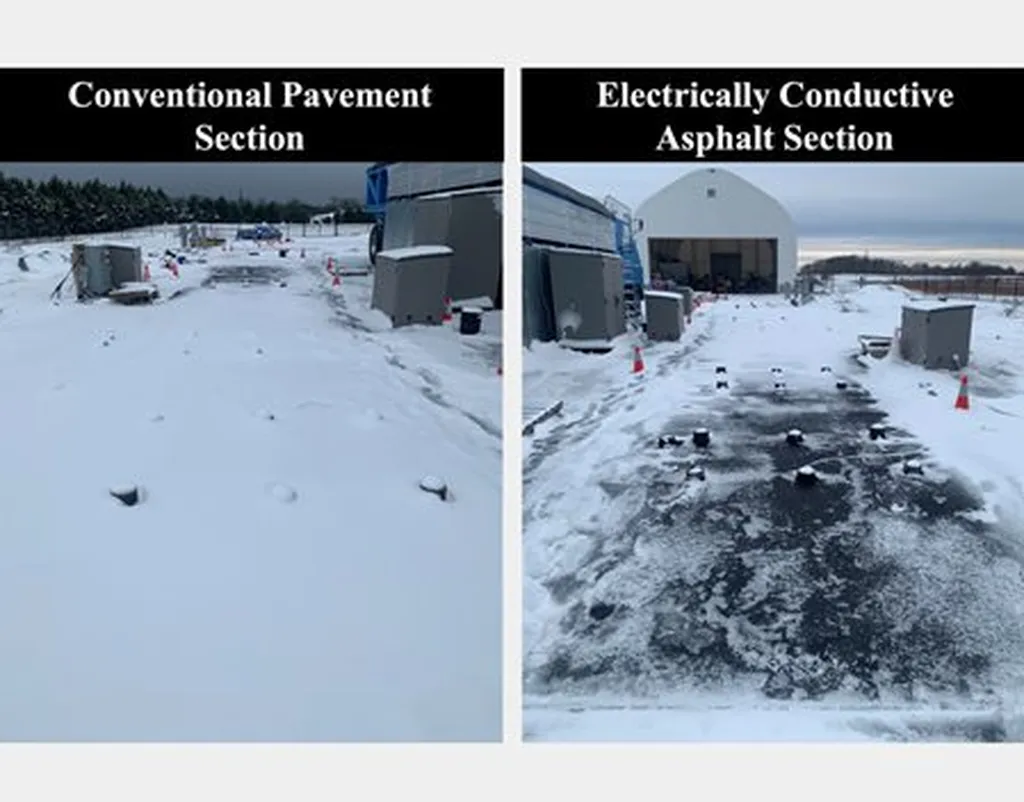In the quest to make roads smarter and safer, particularly in harsh winter conditions, researchers have turned to an innovative solution: conductive asphalt concrete. A recent study, led by Xing Fu of Xiong’an Xiongshang Real Estate Co, Ltd, and published in the journal *Materials Research Express* (which translates to “Materials Research Express” in English), delves into the electrical and mechanical performance of asphalt concrete modified with carbon fiber (CF) and carbon fiber powder (CFP). The findings could have significant implications for the energy sector, particularly in the realm of winter road management.
The study focuses on understanding the conduction mechanisms within CF-CFP modified asphalt concrete and evaluating its road performance under various conditions. By incorporating CF and CFP as conductive fillers, the researchers applied percolation theory, effective medium theory, and tunneling effect theory to elucidate the primary conduction mechanisms within the composite material.
One of the key findings is that the electrical conductivity of CF-CFP asphalt concrete is primarily governed by the tunneling effect, with CFP acting as a crucial nodal point to enhance the conductive network. “The tunneling effect plays a pivotal role in the electrical conductivity of the material,” explains Fu. “CFP serves as a critical junction, facilitating the flow of electricity and enhancing the overall conductive network within the asphalt concrete.”
The study also reveals that adding CF at 0.4% by mass of aggregates and CFP at 2.0% by mass of asphalt significantly improves the dynamic stability of the material, yielding a 75.6% increase compared to conventional asphalt concrete. This enhancement in mechanical performance, particularly high-temperature rutting resistance, makes the material suitable for use in de-icing and snow-melting applications.
However, the inclusion of CFP slightly reduces water resistance under immersion and freeze–thaw conditions. “While the CF-CFP asphalt mixture meets regulatory requirements for water stability, the presence of CFP does have a minor impact on water resistance,” notes Fu. “This is an area that warrants further investigation to optimize the material’s performance in diverse environmental conditions.”
The commercial impacts of this research are substantial. The development of conductive asphalt concrete opens up new possibilities for smart pavements that can efficiently manage winter road conditions. This innovation could lead to reduced energy consumption and maintenance costs, as well as improved safety for drivers. “The potential applications of this technology are vast,” says Fu. “From reducing the need for traditional de-icing methods to enhancing the durability of road surfaces, the benefits are manifold.”
As the energy sector continues to explore sustainable and efficient solutions, the findings from this study provide a promising avenue for future developments. The integration of conductive materials into asphalt concrete represents a significant step forward in the evolution of smart infrastructure. With further research and optimization, this technology could become a standard in winter road management, offering a more efficient and environmentally friendly approach to maintaining safe and functional roadways.
The study, published in *Materials Research Express*, offers a comprehensive analysis of the electrical and mechanical properties of CF-CFP asphalt concrete, providing valuable insights for engineers, researchers, and industry professionals. As the quest for smarter and more sustainable infrastructure continues, this research paves the way for innovative solutions that could reshape the future of road management.

